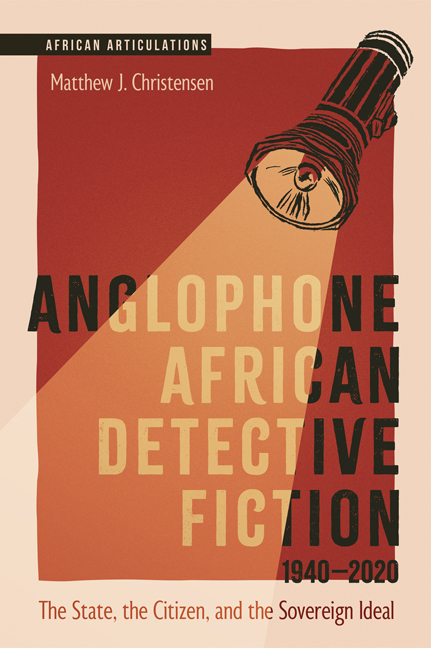Book contents
- Frontmatter
- Dedication
- Contents
- List of Illustrations
- Acknowledgements
- Introduction
- Part 1 Africanizing Detective Fiction’s Un/Sovereign Subjects
- Part 2 Neoliberal Noir
- Conclusion: The Future Imperfect
- An Anglophone African Detective Fiction Bibliography, 1940–2023
- Bibliography
- Index
- Miscellaneous Endmatter
4 - Neoliberal Noir
Published online by Cambridge University Press: 11 May 2024
- Frontmatter
- Dedication
- Contents
- List of Illustrations
- Acknowledgements
- Introduction
- Part 1 Africanizing Detective Fiction’s Un/Sovereign Subjects
- Part 2 Neoliberal Noir
- Conclusion: The Future Imperfect
- An Anglophone African Detective Fiction Bibliography, 1940–2023
- Bibliography
- Index
- Miscellaneous Endmatter
Summary
During the final decade of the twentieth century Kenya underwent what one specialist calls ‘the most rapid and total deregulation of an African economy ever seen’ (Smith 2008: 33–34). The country had witnessed half of its International Monetary Fund and World Bank aid withheld from 1990– 1992 for not implementing multiparty elections and again a few years later for not privatizing public corporations briskly enough for the funding agencies’ managers. In response, finance minister Musalia Mudavadi took the steps of abolishing import licensing and price controls, floating the currency, ending restrictions on profit repatriation, and slashing public spending and civil servant roles and otherwise reshaping governmental priorities and processes to align with the IMF's and World Bank's neoliberal economic imperatives. On one hand, the public welcomed reforms like multi-party democracy and governmental transparency that checked the abuses of power endemic to President Daniel arap Moi's twenty-three-year rule. On the other, there was outrage at what was perceived as the international funding agencies’ appropriation of Kenya's political sovereignty. Moreover, coming after a period when democracy had been associated with the equitable distribution of resources to the public, neoliberalism's valorization of individualized accumulation and income inequality left large segments of the population feeling that Kenya's social fabric had rotted (Smith 2008: 21, 31).
Variations on the Kenyan experience have played out across the African continent since the 1970s. With massive loans needed to mitigate the debilitating effects of the oil shocks and global recessions of that decade, African governments seeking aid from the World Bank, the IMF, and other global development banks were forced, like Kenya, to adopt a range of governance reforms that undermined the nationalist consensus that structured state-citizen relations during the first decades of independence. While tenuous in practice, that consensus was predicated on the developmentalist paradigms discussed in earlier chapters, through which governments would oversee jobs programs, price controls, and other forms of economic planning and lead the citizenry to the higher levels of prosperity enjoyed by the industrial nations of the Global North.
- Type
- Chapter
- Information
- Anglophone African Detective Fiction 1940-2020The State, the Citizen, and the Sovereign Ideal, pp. 115 - 142Publisher: Boydell & BrewerPrint publication year: 2024

